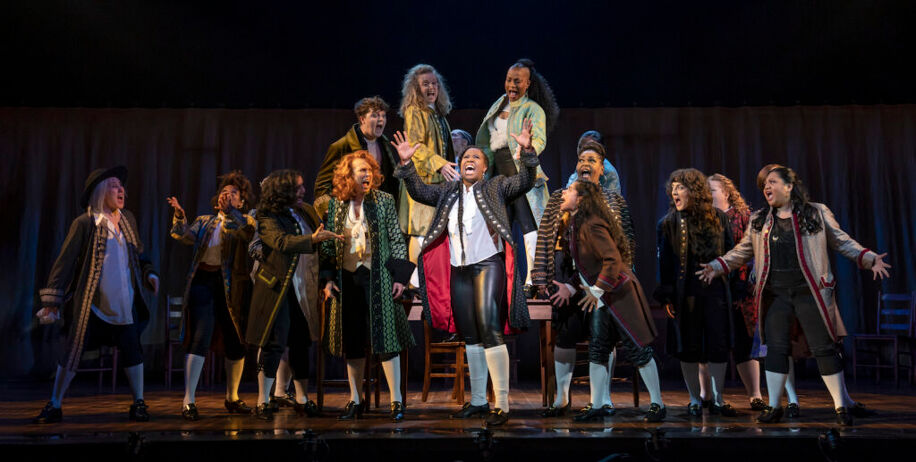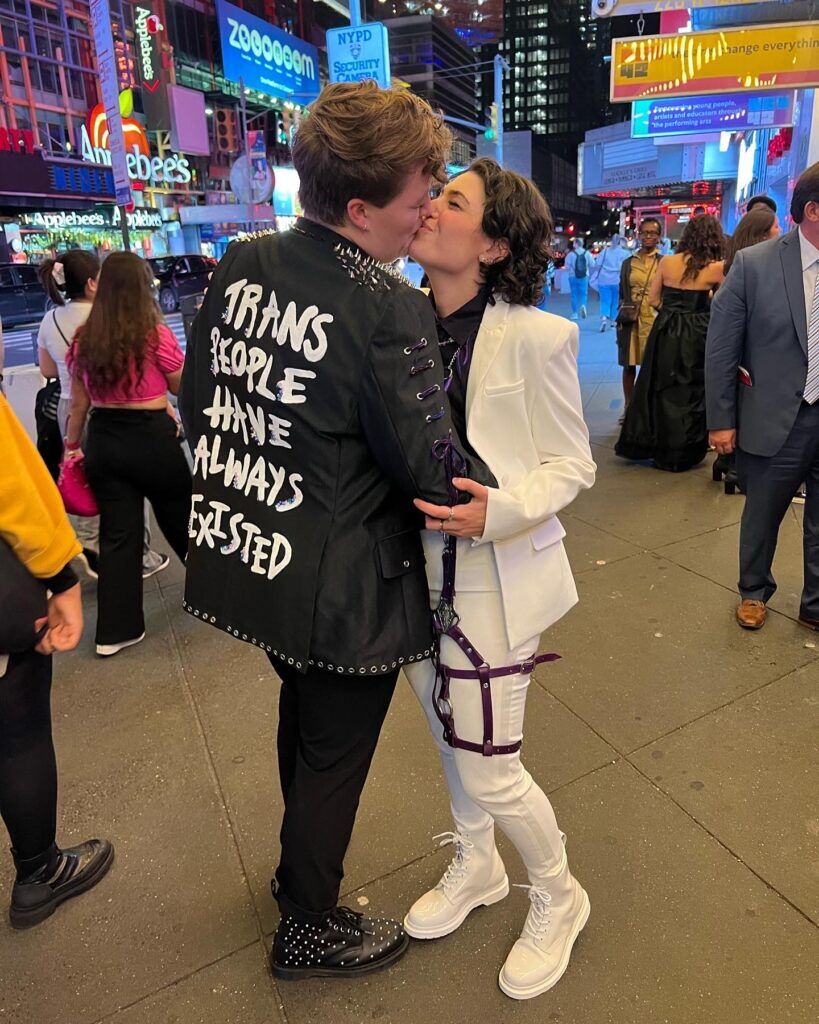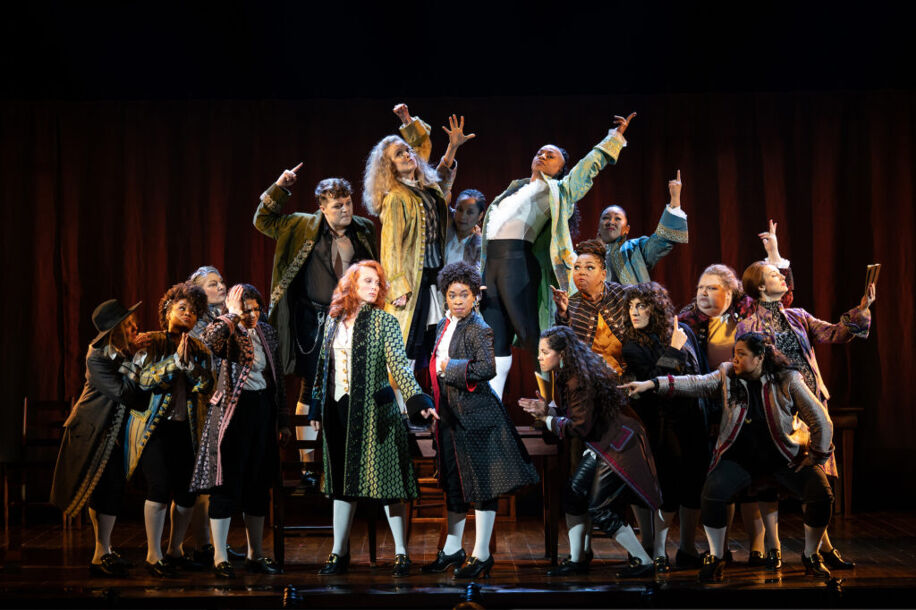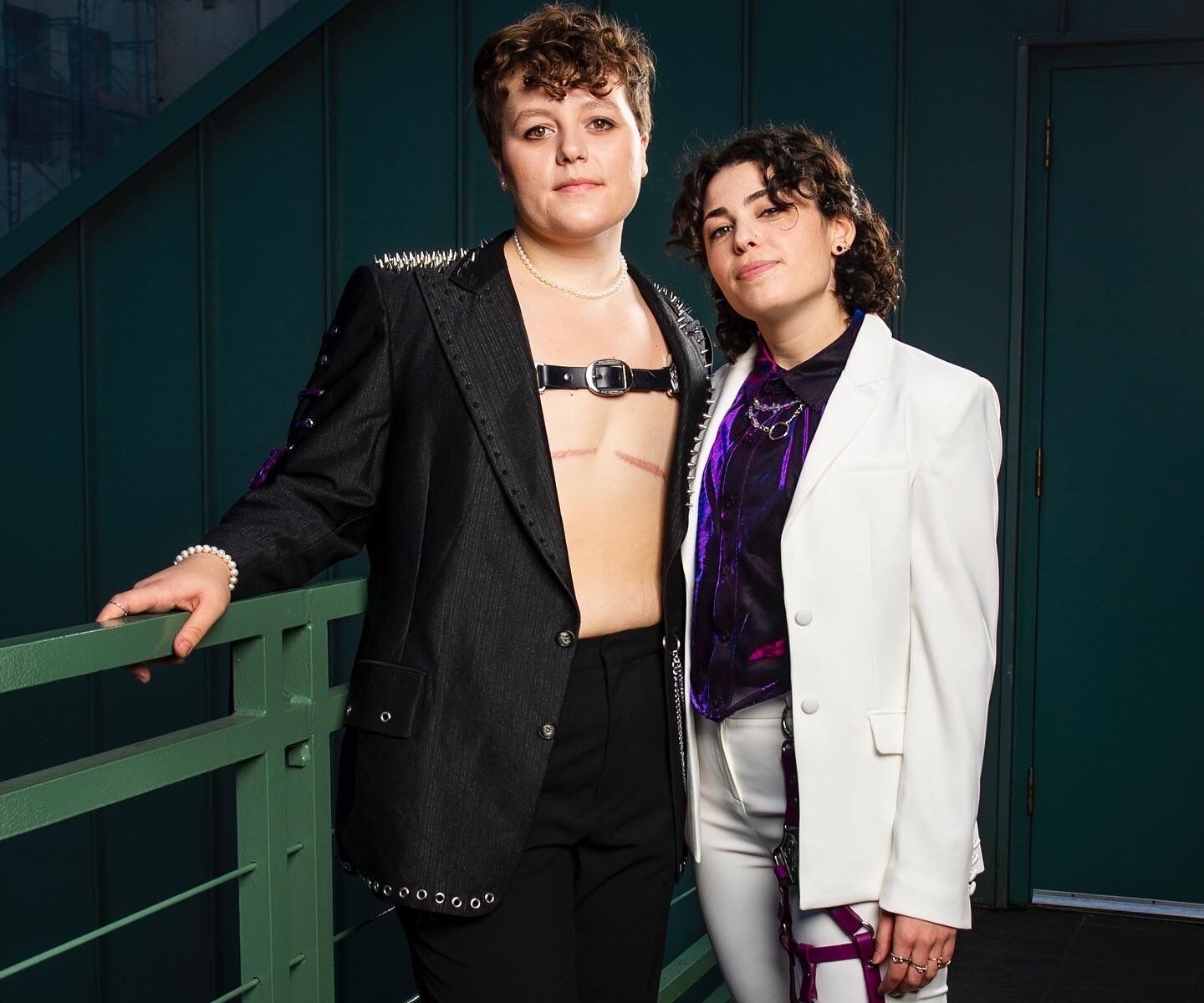Sav Souza, left, and Ariella Serur. Photo by Daniel Rader. Styling by @StyledBySchu. Sav Souza’s jacket by @Gubbins.nyc,. Custom harnesses by @ColdenCalfLeather.
By their own admission, Ariella Serur and Sav Souza are perhaps the least likely couple to be appearing on Broadway — until now. Roundabout Theatre Company’s 1776, which recasts our founding fathers with female, transgender, and nonbinary actors, has cracked open the door for more diverse representation, and they’re not looking back.
“Just one of us being on Broadway would be outrageous, but the fact that our queer *sses get to do this together — incredible, ” said Souza, who uses they/them pronouns, on the couple’s TikTok channel before the show’s October 6 opening.
@savandariella Replying to @savandariella Reposting this because our voice over was removed!! #queercouple #broadwaydebut #broadway #transrepresentation #nonbinary #queerbroadway #tiktokmusical #silkchiffon ♬ Silk Chiffon – MUNA
1776 won the Tony Award for Best Musical when it premiered in 1969. The revival’s reception — co-directed by Jeffrey L. Page and Diane Paulus — has conjured as much debate as the midterm elections. Paulus told the New York Times the show “is to hold history as a predicament, rather than an affirming myth.”
The predicament has extended beyond the actions of the Second Continental Congress. Souza and Serur have been with the production since its run last summer at Harvard University’s American Repertory Theater. The Broadway transfer split critics.

“You leave the production newly amazed by the radical contingency of history as we know it — how close it came to falling out differently, and what it cost to get there — and the prospect feels at once scary and freeing,” wrote Adam Feldman for Time Out.
Though Kelsy Chauvin for Queerty described the production as “dated” despite its reimagining, she also acknowledged, “It’s easy to want to like 1776, not only because of its embrace of diverse identities but because many Americans, this writer included, straddle a sense of patriotism and national ownership with very real worries about the erosion of civil rights and equality. America’s history is messy at best.”
Regardless of the critical or audience response, Serur and Souza have a job to do: show up at the theater eight times per week and revisit history through a decidedly unconventional lens.
Let’s Fall in Love
View this post on Instagram
Souza, 26, auditioned for the production in 2019 and was cast in early 2020 as New Hampshire’s first governor Dr. Josiah Bartlett, but then, as they describe, “Miss ‘Rona came along and said, ‘Never mind, I’m going to hold on to that.’ ”
Around the same time, Serur and Souza performed in a concert, having been separately “tipped off” by mutual friends that there might be a connection — but, once again, the pandemic had other plans. Serur was impressed with Souza’s determination and crowd-funding efforts to fund their top surgery. The pair finally reconnected that summer, just before Serur left on a cross-country road trip.
“We kind of fell in love in one night and then did some long distance. And now we are living together in Bushwick and creating a home and a life,” says Serur, 30, who uses she/they pronouns. Serur shares that the couple is “obsessed” with making their space feel personal through custom painting, maintaining a quaint backyard, and nesting with their cat, Lula.
They’re also co-writing the musical, We Start in Manhattan, which they hope will provide future opportunities for other actors who don’t fit Broadway’s typical binary mold.
As if the pair isn’t busy enough (Serur is a standby for four roles and performed for most of the first month on Broadway, along with special appearances like the ACLU/NYCLU’s Sing Out For Freedom concert), creating new work keeps them energized and optimistic for what onstage representation can look like.
It Takes Two
“Our musical is a two-person, queer, rom-com slutty musical — free of queer trauma,” says Serur. “It’s about love with an expiration date, essentially. So it’s kind of like an anti-rom-com; we’re also trying to queer the genre.”
View this post on Instagram
“Sav’s character is trans masc. I identify as agender and nonbinary, so the character that I’m originating, like, I don’t really care if a cis woman plays it, or another nonbinary person, or another trans person, or trans woman. There’s fluidity there,” Serur continues. “As writers, we’re making a lot of space for that fluidity as far as pronouns and [music] keys, and the logistics of the piece, especially as it relates to my role. We hope when we do our show that other people play these roles, maybe in repertory, so we’re not the representation of this queer love.”
“While we know so far in working on our piece that it is relatable and interesting to people that aren’t queer or trans, it’s still for us. Theater can be really powerful in that way.” — Ariella Serur
“So often, the stories told about queer people are still not for them — for us — they are to be palatable to the masses,” says Serur. “And while we know so far in working on our piece that it is relatable and interesting to people that aren’t queer or trans, it’s still for us. Theater can be really powerful in that way.”

“I’m most excited about expanding the canon — having the canon be blown open with new works like A Strange Loop and our musical, and getting the people who we want to see on stage also writing the stories instead of taking the stories written by people who have had plenty of representation,” says Souza. “But I’m also interested when revivals come because I’m obsessed with theater, examining the things that have been made and the imperfections that we continue to make in theater. If we made anything perfect, we would stop making.”
Related: Unapologetically Big, Black, and Beautiful, A Strange Loop Has Changed the Face of Broadway
The pair also recognizes that theater is a business, and decision-making often comes down to money. A two-person musical is a more viable investment and a product that could make its way to universities and regional theaters.
“We hope that when we find the producers and the institutions that are excited about this piece, we’re able to brainstorm and troubleshoot together,” says Serur. “We have these ideas that might seem radical; how can we work together to make this happen?”
Combating the Quick Take
In a culture of digital scrolling and fast swipes, theater fans have easy access to reviews and reactions. But 1776 asks more of its audiences.
The Pulitzer Prize-winning lesbian playwright Paul Vogel said in an interview with The Broadway Blog, “Can we get excited by the fact that it will take us time to process a new voice? That it will take us days, months, or years to travel in our minds to process what we saw on a single evening at the theater? That’s what I’m talking about when I say a play is ambitious.”
Page and Paulus have created such a framework — one that asks us to see our founding fathers through an entirely new and occasionally cloudy lens.
“This play is still about the binary in so many ways. You have a bunch of men and two women, and how the women are treated on stage is very different from how the men are treated. And the amount that the women have versus the not the men have — the binary is so embedded in this,” says Serur. “While yes, that is true, and it’s interesting to go back and forth between these very coarsely written genders, Sav and I are interested in nonbinary work and having —for me, personally —gender removed. That will feel very affirming.”
The rehearsal process, for Souza, revealed even more layers of gender identity and presentation.
“I am the person on stage who is the closest to how the show has traditionally been cast,” says Souza. “Pretty much every other person on stage is at least a couple of degrees further away from being a white cis male than I am. It’s interesting to think about physicality and how a guy would sit at this moment. How would he cross his legs? These are things that I’ve already investigated in my own body and presentation because that’s how I present myself in the world. I’m watching all these people who walk through the world as women or more comfortable in their femininity than I am, [then] try to adapt their femininity to fit into these masculine shapes and figures. For me, that doesn’t feel like a process. That’s where I sit already. Then I’m like, am I acting? How do I still make it feel like I’m performing when this is my home base? It was an interesting investigation regarding my relationship to the material and the binary it dances around.”

With ticket prices ranging from $69 to $260 each, the other dance that Serur, Souza, and the acting company is navigating is overcoming the barriers to access for queer audiences.
“We want to see people that look like us in our audiences,” says Souza. “I feel grateful that we are at an institution that has been hearing those requests.” In collaboration with Breaking the Binary Theatre Festival and Thee Open House Project, the Roundabout recently hosted an evening that provided complimentary tickets to queer and trans theatergoers, including a pre-show reception and post-show talkback with cast members who identify as gender expansive.
“We keep getting more bodies on stage that deserve to be there,” says Souza. “We’re hopefully getting bodies in audiences that deserve to be there as well.”
Transformation Begins with Education
View this post on Instagram
This season has seen a wave of queer onstage representation beyond the cis-white gay lens. Alexandra Grey (Empire) starred in Billy Porter’s concert revival of The Life, Angelica Ross (Pose, American Horror Story) made her Broadway debut in the long-running revival of Chicago, and Justin David Sullivan is winning hearts as the nonbinary best friend in the new hit musical & Juliet. For Souza, finding their path to the Broadway stage required resilience and determination in an educational system that needs to be dismantled and rebuilt.
Related: Angelica Ross on Her Broadway Debut, Reclaiming Musicals, and Tech Passion
“I spent 20 years of my life pretending to be a girl. And while doing that, I was still pursuing theater,” says Souza. “I was told that I didn’t fit in any of the roles that existed for women. I wasn’t pretty enough to be the ingenue or funny enough to be the funny b*tch. I didn’t check any of the boxes. Through college, when I was coming into myself, I went from being told there’s a sh*t ton of roles, but none of them are for you, to there are no roles now that I was identifying as trans. Through those frustrations and experiences, I found myself turning toward creating my own work and starting to write and carve out space for myself in the industry.”
Souza, originally from Tracy, California (which they refer to as“a little cow town”), attended Philadelphia’s University of the Arts and, halfway through their training, threw out their repertoire book because they “didn’t want to sing about being a woman anymore.” Quickly realizing there was a limited amount of material, Souza began to compose, revealing another necessary leap of faith in an industry already filled with hurdles. “I’ve grown to love and take so much pride in the agency that I now have to create my own work and carve out that space,” they say.
At school, Souza found a tight-knit group of queer theater friends, and during one summer between semesters, they began investigating gender. “It was just beautiful to be part of this cornucopia of evolving genders,” recalls Souza. But when they returned to school, “it was a bit of a journey, to say the least,” to bring their gender identities into the classroom and onto the stage. Souza found a ray of light in voice teacher Jenna Pastuszek.
“She was ready and willing to learn along with me,” recalls Souza. “I came into my voice lesson and said I have to start over. And she said, ‘Let’s do this.’ She was there with me, commuting from New York City to Philadelphia to ensure I got what I needed to get through the program.” And though Souza faced some challenges with a few professors who weren’t sure how to revisit the canon through an LGBTQ-inclusive lens, the school was supportive of new queer work, giving Souza the opportunity to star as the trans lead in a new musical written by one of their trans friends — it was the first time Souza played a role that aligned with their identity.
“Anything can be flipped on its head. And it should be.” — Sav Souza
“It’s ironic because, as actors, we fit into other people and play: that’s our job. But there’s an element where fitting into certain types of people just doesn’t feel good,” says Serur. “As I understand myself and my identity more, I’m having language for that, and will continue to create work that feels like it fits.”
When asked how to make room to reinterpret titles that are part of the musical theater canon, Souza doesn’t mince words: “If we’re going to be reviving things, they better be f*cking different. Personally, I do not want to see a production that could have been done in the 1900s. Some people love to treasure and to hold these things so preciously. I do not resonate with that. It’s a polarizing topic — that we’ve changed 1776. People are like, ‘Leave it alone!’ But anything can be flipped on its head, and it should be.”
1776 plays on Broadway through January 8, 2023.
Additional contribution by Henry Giardina.
Don't forget to share:
Help make sure LGBTQ+ stories are being told...
We can't rely on mainstream media to tell our stories. That's why we don't lock our articles behind a paywall. Will you support our mission with a contribution today?
Cancel anytime · Proudly LGBTQ+ owned and operated
Read More in Culture
The Latest on INTO
Subscribe to get a twice-weekly dose of queer news, updates, and insights from the INTO team.
in Your Inbox













